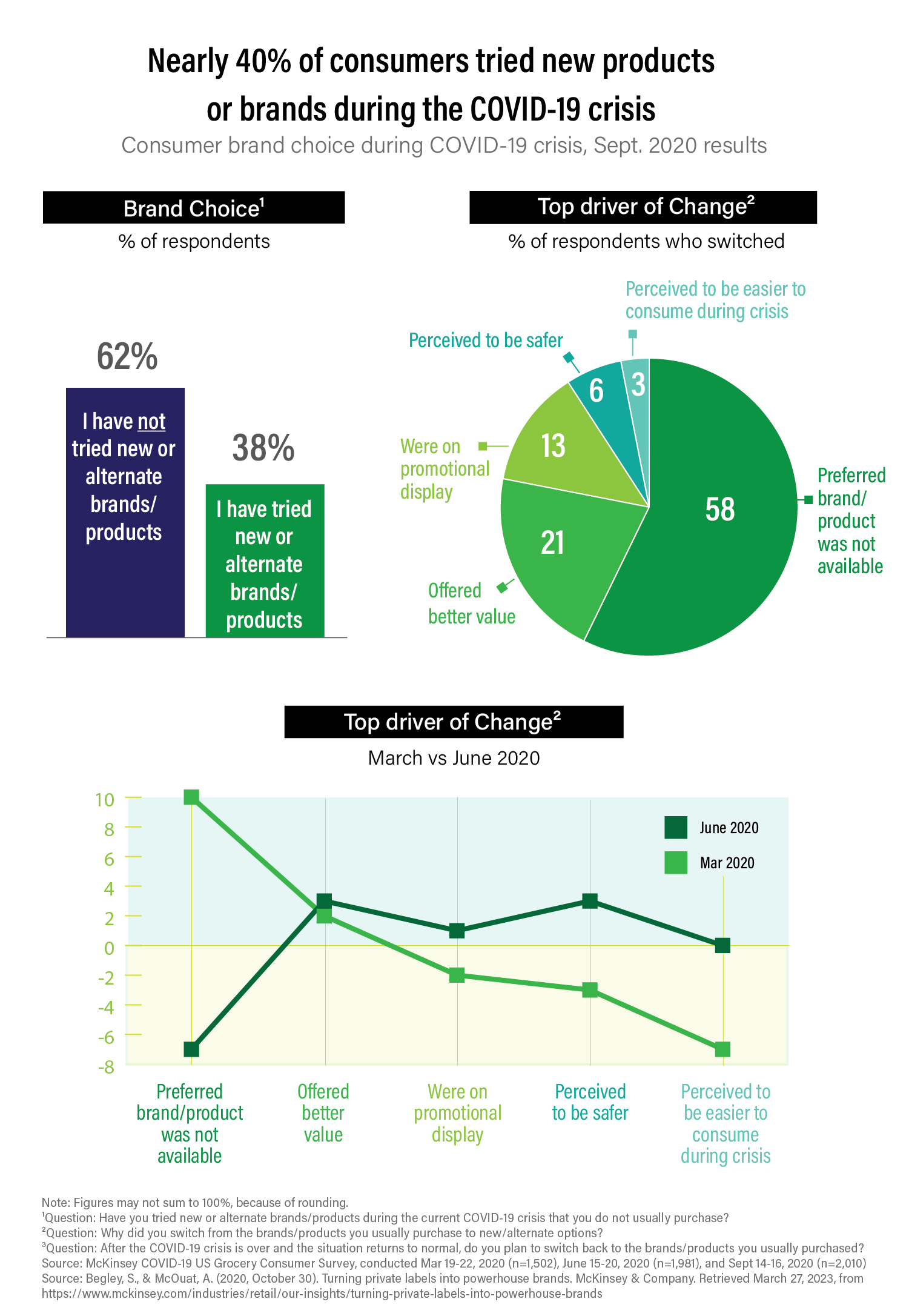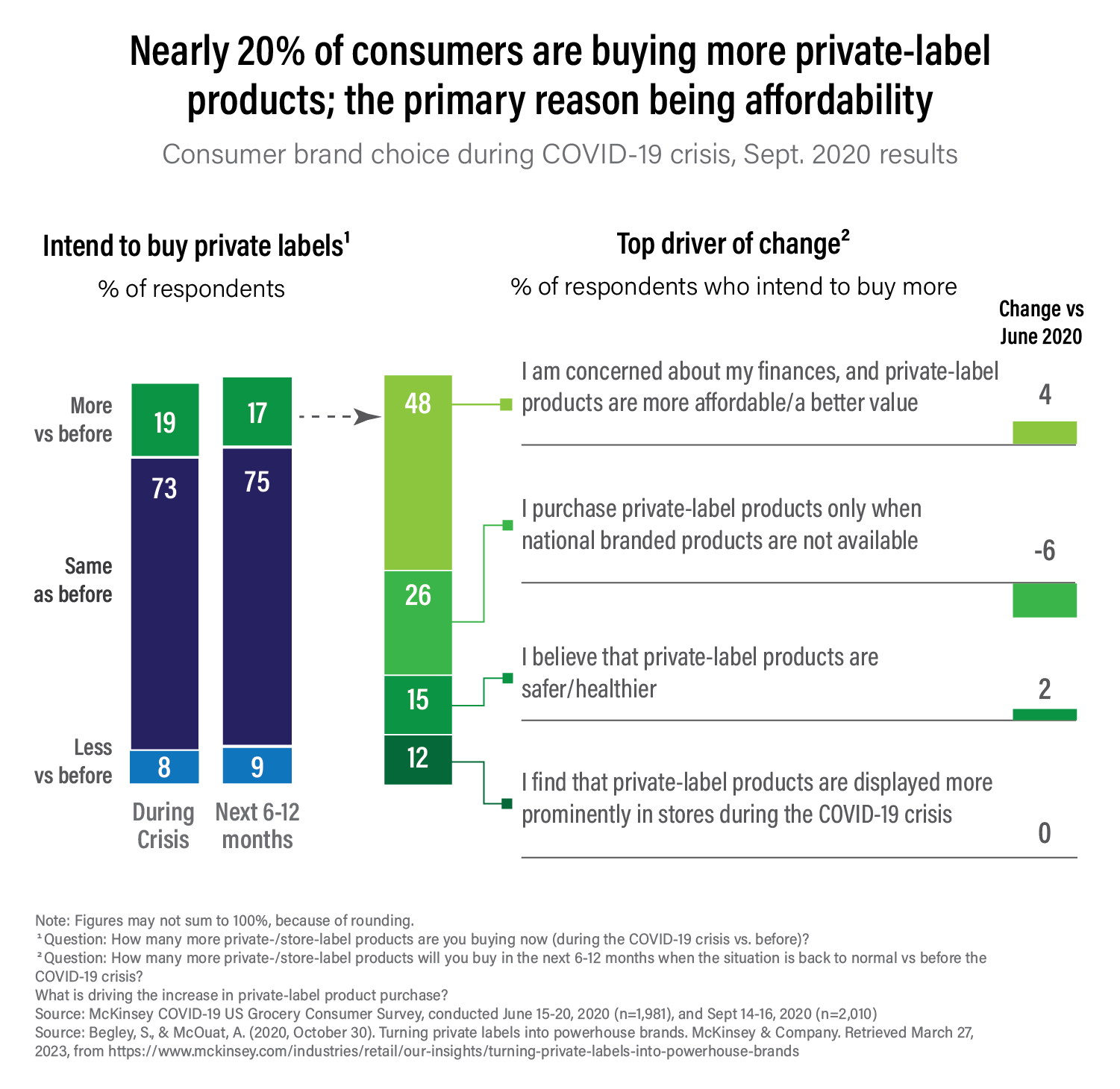Store brands, also known as private labels, are becoming more and more popular among grocery shoppers, and the COVID-19 pandemic has only made them even more appealing. When national brand products became scarce due to panic buying and stockpiling, people had to look for alternatives that were both high-quality and readily available. Private-label goods provided a solution with their high availability and lower price point. This is good news for grocery shoppers because private-label products offer a reliable source of cost-effective, high-quality ingredients, especially during times when traditional food production industries struggle with inventory shortages.
For those who love to cook at home, private label products can help you create delicious meals with high-quality ingredients at a lower cost. These products can also help grocery stores remain competitive and provide more affordable options for shoppers. However, it's important to pay attention to the quality and selection of private-label goods to ensure that they meet your expectations. Grocery stores must focus on quality control and careful selection of products to keep their customers happy.
While store brands may not always be the first choice for some consumers, it's important to remember that they can offer a great value and quality alternative to brand-name products. Grocery stores should offer a diverse range of options that include both brand-name and high-quality store brand products to appeal to a wide range of shoppers. This will help build loyalty among both first-time and returning customers and keep everyone satisfied with their shopping experience.
Changing Consumer Purchasing Patterns
The ongoing COVID-19 crisis has resulted in a significant shift in consumer behavior, favoring private labels in the market. A survey conducted by McKinsey & Company of over 2,000 US grocery shoppers in mid-September revealed that almost 20% had increased their consumption of private-label products compared to pre-pandemic patterns.

Price is one of many driving factors for customers turning to private labels, with over 45% of consumers citing it as the primary reason for switching. The second most common reason was the absence of their preferred national brands. This development highlights the importance of understanding evolving consumer preferences and needs, affecting the retail industry's dynamics. Retailers need to adapt their approach by focusing on high-quality, competitively priced private-label products, ensuring they have a compelling value proposition in place for when consumers inevitably reevaluate their brand choices post-crisis.

How Private Labels Can Build Lasting Customer Loyalty
Many retailers have yet to fully realize the potential of private-label products and brands, failing to define their value proposition and position within the product assortment. Although some have set margin and penetration targets and even restructured to prioritize private labels, they fall short in aligning their aspirations and devising a comprehensive strategy. To capitalize on the benefits of private labels, retailers must invest in a well-thought-out plan that considers the unique positioning and value of such offerings within their businesses.
The global pandemic presents a chance for retailers to strengthen their private-label strategies, as consumers' shopping behaviors are continually adjusting to the new normal. A well-executed private-label offering can foster long-term customer loyalty, provided that retailers stay attuned to the evolving market dynamics and adjust their strategies accordingly. Continual innovation and reevaluation are crucial for maintaining and improving a competitive edge. Retailers must embrace the transformation of the retail landscape to thrive in today's rapidly changing business environment.
The Importance Of Refining And Testing Private-Label Aspirations
In today's retail landscape, retailers must continually reassess their store brand aspirations to remain competitive. McKinsey and Company have pointed out that private labels have different maturity stages worldwide. To maximize success, retailers must focus on key aspects, including:
- Brand awareness
- Customer perceptions
- Market penetration
- Quality and value
- Profitability
- Store loyalty
Retailers should use strategic assessments like customer surveys, competitor scans, and financial analyses to close the gap between current performance and desired aspirations. This will help them position their store brands for long-term success in a rapidly changing market.
Mind The Gap: A Closer Look At Your Business Performance
A systematic approach must be taken to identify and address areas needing improvement to comprehensively evaluate a retail business. This involves a high-level assessment followed by a deeper analysis of five key domains as highlighted by McKinsey and Company:
- Brand strategy
- Assortment & pricing
- Marketing & packaging
- Product design & sourcing
- Organization & operating model
By examining these areas, retailers can create a targeted action plan to improve performance, attract customers, and drive business growth. A successful retail business requires a cohesive and intelligent foundation that leverages all elements harmoniously and well-coordinated.
Brand Strategy
Consumers typically associate private-label products with lower prices but not necessarily superior quality, innovation, or excitement. Perception can vary based on category, with some private-label items priced higher or lower than national brands. To address this, retailers should establish clear definitions for each brand's value proposition, communicate guidelines, and empower teams to deliver consistently.
Successful private-label strategies require understanding target customers, defining unique value propositions, identifying thriving categories, and establishing necessary guardrails for execution. By addressing these questions, retailers can create a strong foundation for long-term success.
As the retail landscape continues to evolve, opportunities for innovation and differentiation in sourcing are emerging for retailers to seize. With consumers becoming more comfortable with private labels, retailers can confidently introduce innovative products that surpass traditional CPG brands. By leveraging their unique position of having access to valuable consumer insights across multiple brands, retailers can identify customer patterns and preferences that may need to be apparent to individual CPG manufacturers. Several retailers focusing on private-label products have successfully built strong customer loyalty by positioning themselves as trendsetters. This approach has allowed their private labels to provide a "halo" effect, enhancing their retail brand's overall reputation and desirability.
Organization And Operating Model
In the dynamic world of retail, it's important to recognize that a one-size-fits-all approach to supporting private labels is ineffective for every retailer. A range of operating models is available, from highly centralized systems to more flexible and decentralized ones. Highly centralized models typically have dedicated departments for brand management, product design, sourcing, quality assurance, marketing, and consumer insights, which provide a cohesive and streamlined process. However, some retailers prefer a decentralized approach, where merchandising teams are responsible for devising and executing strategies, offering greater agility and adaptability. Ultimately, the choice between centralized and decentralized models depends on the specific goals and priorities of the retailer, requiring ongoing assessment and refinement of the private label management approach.
In private label development, centralized teams play an essential role, particularly during the initial stages, as merchandising teams rely on their expertise and support to identify opportunities and consistently deliver on the brand's value proposition. Centralized teams are also crucial in well-established private label markets, where they administer critical functions, such as maintaining differentiated brand standards and managing innovation pipelines. However, in less developed private label markets focusing on price differentiation and imitation products, a streamlined, centralized team can establish price and quality parameters while assigning execution responsibilities to category teams. This approach optimizes resources and ensures a competitive edge in the ever-evolving private label landscape.
The Future Of Private Labels In A Post-Pandemic World
Private-label sales have grown significantly during the pandemic, providing retailers with much-needed support during challenging times. However, with the emergence of a post-pandemic world, it is uncertain whether consumers will continue to prefer these labels over established brands. Retailers have a crucial role in shaping this outcome through their strategies and actions. They can transform private labels into formidable brands that cultivate long-term consumer loyalty by taking an ambitious approach and addressing any weaknesses in their offerings. In doing so, they can strengthen their market position and establish a lasting niche for private labels in the ever-changing retail landscape.









